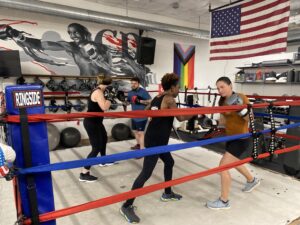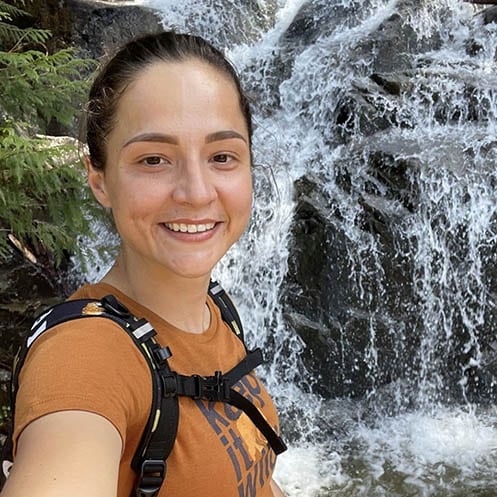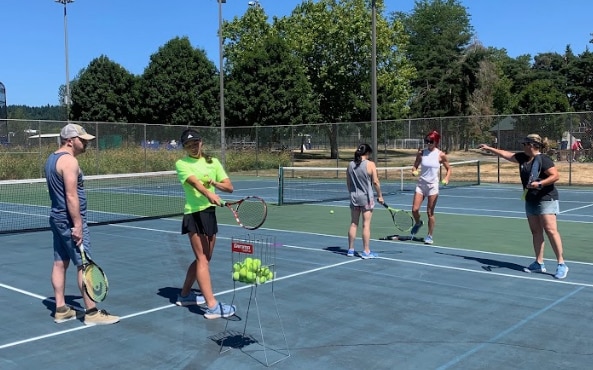-
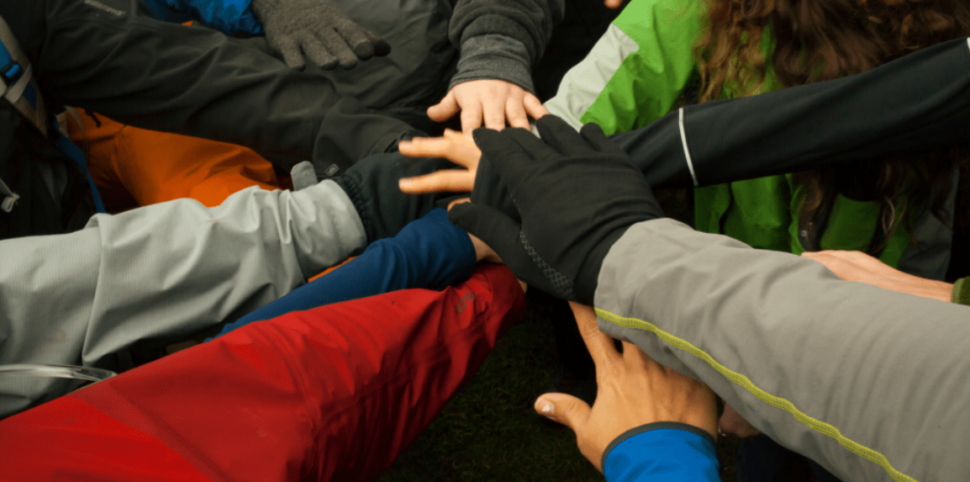
Peers Supporting Peers
Peers Supporting Peers
Peers Supporting Peers is at the center of Recovery Beyond conversations and activities.
You’ll find people at all levels in recovery who can meet you wherever you might be in your journey.
Whether the event is boxing, rock climbing, or kayaking, you know you’ll have the support of peers cheering you on through physical activities and challenging life moments alike.
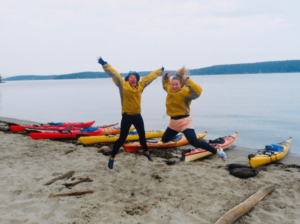
Let’s Walk and Talk
 Tawnia, Recovery Beyond’s Peer Support Supervisor and a certified Peer Counselor, is creating a new event series specifically focused on discussing life skills and recovery. Topics include conflict resolution, using “I” statements, and building a support network.
Tawnia, Recovery Beyond’s Peer Support Supervisor and a certified Peer Counselor, is creating a new event series specifically focused on discussing life skills and recovery. Topics include conflict resolution, using “I” statements, and building a support network.These new events, known as Chat Walks, will offer a place for organized, topical discussions as you stroll through various parks in King and Pierce counties.
If you are unable to attend Chat Walks but are interested in conversing on these topics, we offer weekly Virtual Huddles. This virtual option will cover the same themes as Chat Walks but you can participate from the comfort of your home.
You can find the bi-weekly Chat Walks starting in 2023 on our Community Calendar.
Options for Support
If you need extra support in recovery, light case management, or resources for services, you can schedule a meeting with Tawnia.
She can help navigating larger systems, resources and referrals for housing and food assistance, guidance and support with self-advocacy, or assist in improving life skills such as communication. Contact Tawnia here to set up a one-on-one appointment.
She describes a certified Peer Counselor as, “Someone who guides and supports you in your hardest time. Peer Counselors are there to remind you of your value, worth, and importance. It’s someone who has your best interest at heart. Their only role in your life is to see that you get your needs met in the way that’s best for you, knowing that you are the best expert in yourself.”
0 -
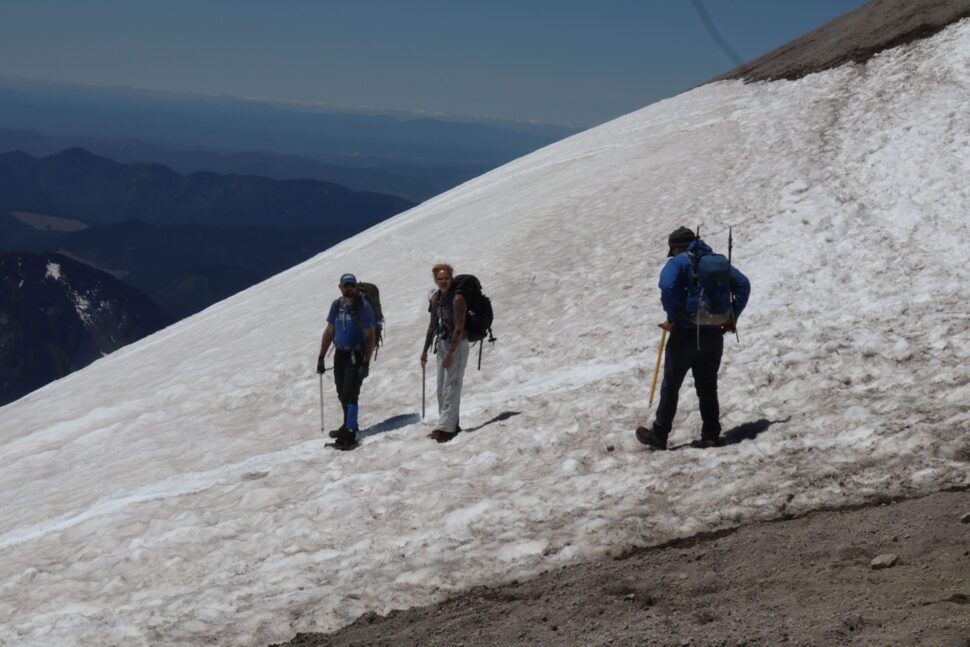
8 Tips for Handling the Holidays
Holiday Stress? Here’s What To Do
Did you know 80% of people report that the holiday season is somewhat or very stressful?
The holidays can be difficult, especially when you’re in recovery.
Holidays tend to amplify feelings of grief and loss and it can be hard to feel happy, celebratory, or grateful.
Family gatherings, holiday parties, and less daylight can trigger anxiety, fatigue, irritability, feelings of loneliness, and abnormal sleeping habits.
8 Tips for Beating Holiday Stress:
- Check in with your support system
- Move your body
- Give yourself something to look forward to after the holiday season
- Consider creating new traditions
- Expect a range of emotions – that’s okay!
- Acknowledge your thoughts and feelings
- Prioritize your recovery
- Stick to a routine
We’re Here For You!

Remember, loneliness is a state of mind, not a state of being. Don’t forget to be kind to yourself as the year comes to a close.
We’re here for you if you need extra support.
Check out our Community Calendar, full of activities for moving your body and finding peer support.
Find out more information about booking a one-on-one session with a Peer Counselor here.
-

7 Days, 9 Participants, 1 Adventure: A Recap of the 2022 Annual Expedition
Recovery Is An Adventure
At Recovery Beyond, we believe in cultivating a spirit of adventure, wholeness, and health through consistent, no-cost, programming. This ranges from weekly bouldering sessions to monthly community gathering, to our larger, more unique events.
The Audacious Annual Expedition is the largest event of the Recovery Beyond calendar year and gives Participants a substantial goal they can work towards.
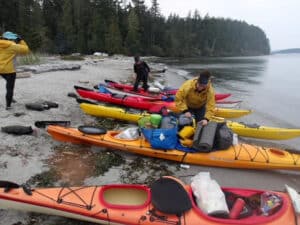 Our 2022 Audacious Annual Expedition took Participants on a kayaking trip around the San Juan Islands.
Our 2022 Audacious Annual Expedition took Participants on a kayaking trip around the San Juan Islands.Learning New Skills
The Expedition Team carried their gear and set up camp each night while kayaking over 20 miles total on the Salish Sea. Cultivating soft skills, in addition to hard skills, became important as the group traveled together.
Communication, collaboration, gear know-how, and long physical days were critical components of the trip.
A Participant shares, “I learned how to perform a wet exit in a kayak, how to ‘put a kayak to bed’, how to properly pack gear and belongings in a kayak, and how to better communicate with others in a group setting.” These skills can be carried into other aspects of life – whether that be communication at work or feeling confident in adventuring solo. Another Participant elaborates, “I have a realistic view of what it takes to kayak camp now! The solo day can be reproduced by myself anytime, it was so beneficial.”
Capturing the Spirit of Adventure
A week of island hopping in the Pacific Northwest without cell phones provided space to be present and still, a Participant explains, “The one takeaway for me is how important it is to have quiet time in a fast-paced and frantic world…”
A break from the constant business of life, and ample time outdoors, fosters reflection. Contemplation, physicality, and connection to the self and others is important in holistic recovery.
Another Participant conveys, “I can choose to be intentional about prioritizing in my life – family and self first, work second.” While the trip offered these sacred moments, there was plenty to do and plenty of laughs to be had!
Favorite memories from the Expedition include seals following the kayaks and the infamous “raccoon incident”. An overarching theme, however, was that of gratitude.
One Participant shares, “I am eternally grateful that I was able to find the strength and the courage within myself to get myself out out of my addiction (in October 2019) This was an a remarkable part of my recovery journey, going in this sea kayaking adventure and sharing it with [the team].” Another Participant echoed that statement, saying, “I am grateful for new experiences. I am grateful for my life. I am grateful for natural places.”
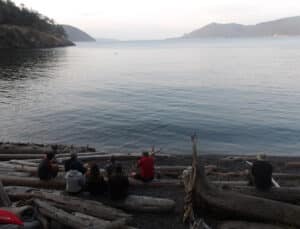
Words of Wisdom
The 2022 Audacious Annual Expedition was a space for connection, reflection, and community. We’ve received positive feedback from the team and are immensely thankful for the openness, bravery, and courage shown by all who attended.
In the spirit of preparing for the 2023 Annual Expedition, we asked the 2022 Expedition team what they would say to someone interested in joining in 2023. Here are a few words of wisdom:
- – “It’s never too early to start packing or preparing, go in with an open mind and open heart. It’s ok to be nervous, it’s completely normal and human!”
- – “Breaking your routine and discomfort are a part of the experience – be open and learn.”
- – “Just let it happen how it is going to happen. Bring more snacks.”
- – “It’s worth it.”
-
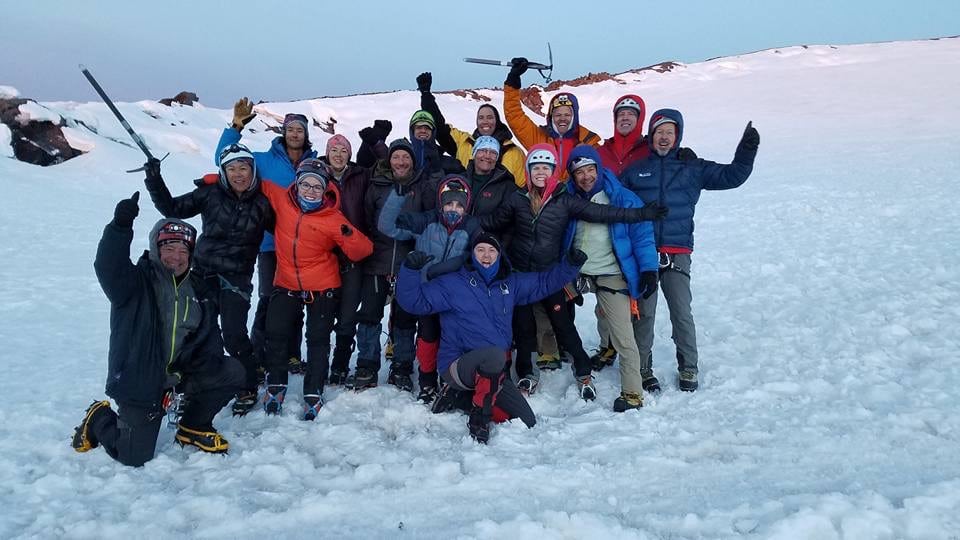
Passing The Torch
Passing The Torch
Today Recovery Beyond is announcing that its Founder and Chair, Mark Ursino, is passing the torch as Board Chair. Mark is confident in the current direction of the organization and will continue to be an enthusiastic supporter and donor. He states, “We have an exceptionally strong Board, we have a clear definition of our purpose and direction. Megan Fisher and Mark Adams have done an excellent job in defining how we develop our new programs, finding partners, and training volunteers…I see Recovery Beyond becoming the first widely successful model in the Northwest for post-treatment, long-term care for people dealing with substance use disorder.” This confidence, in addition to his extensive length of time on the Board, influenced his decision to step away.
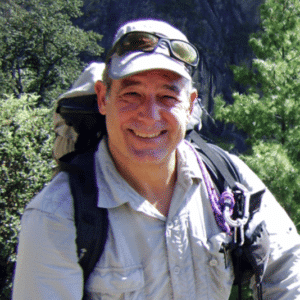
In 2011, Mark began what is now known as Recovery Beyond in partnership with Union Gospel Mission. Together, they turned the dream of summiting Mt. Rainier into a reality with the creation of the Climbing Out Of Homelessness program. This time period continues to hold a special place in Mark’s heart. He shares, “All of my best memories from Recovery Beyond center around the climbing program that started it all. Working with the men and women of the program, teaching them the ways of the mountains, and seeing them grow and develop.” Recovery Beyond Paradigm was created as a nonprofit in 2016 to sustain and broaden the Climbing Out Of Homelessness program. In 2019 the nonprofit’s name was shortened to Recovery Beyond. Soon after, the organization began expanding its offerings from the original climbing track.
Mark leaves us with this thought, “Recovery Beyond is by far the most meaningful and spiritually enriching work I have done in my life. It has been truly life altering. If I were fit to be a volunteer, I’d still be volunteering in the programs. I would encourage anyone who is at all inclined to share something of themselves with others to get involved. Helping people keep their lives on track is an experience you need to have.” To put his love of service and passion for the organization into perspective, he explains, “I was an expedition mountain climber. I was part of an expedition in Peru that was called to assist an ailing climber at 19,000′ on Huascaran Sur. We ended up saving his life. That touched me deeply. The only experience that I’ve had since that has touched me in the same way is volunteering with Recovery Beyond.
Over the past 11 years, Mark has done profound work for those in recovery from substance use disorder and those who have experienced homelessness. He has left a positive impact on the volunteers, participants, and staff members who have been a part of this organization. We are grateful for his vision, indescribable generosity, and support. His legacy continues in the spirit of Recovery Beyond.
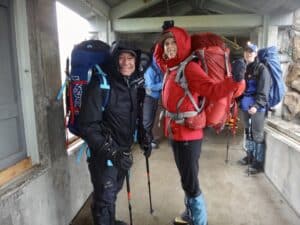
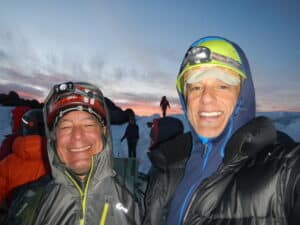
Mark Perry New President of the Board
We are proud to announce that Recovery Beyond Board member, Mark Perry, is now the President of the Board. Mark has been dedicated to Recovery Beyond since 2020 and has been instrumental in supporting the organization by acting as Interim Executive Director in 2021 and holding the position of Treasurer on the Board.
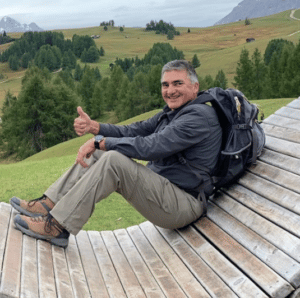
Mark Perry has over 35 years of experience in sales, marketing, and general management that covers a broad range of roles in the Information Technology (IT) industry, most recently at Microsoft where he served an illustrious 25-year career. He enjoys being outside hiking, cycling, and fishing. He works closely with Washington Trails Association (WTA) on trail maintenance teams and is an advocate for increasing access to the outdoors.
Mark has several philanthropic interests where he contributes his time, talents, and financial support. He contributes to Medical Teams International (MTI), Seattle Union Gospel Church, Acres of Diamonds, and Sophia Way. Mark has always had a strong interest in giving back, utilizing his career and personal experiences to help those in need and uplift local communities. He believes philanthropy is the love of mankind.
Introducing the 2022 Board of Directors
Mark Perry – President and Interim Treasurer
Brad Halbach – Vice President
Marcia Hansen – Secretary
Britany Ferrell – Board Member
Read more about our Board of Directors here.
-
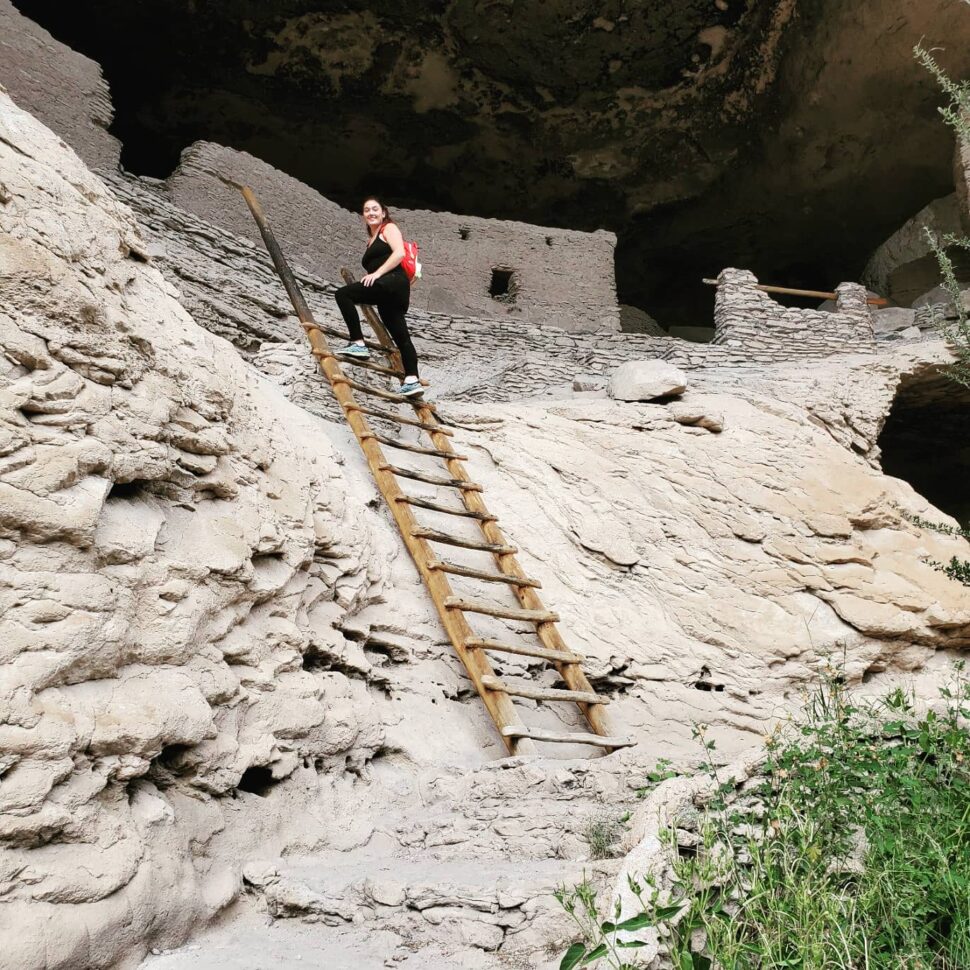
Say Hello To Our Activity Programs Coordinator, Elisa!
Recovery Beyond is excited to welcome Elisa to the team as our Activity Programs Coordinator. Elisa will be our boots on the ground, interacting and managing Participants, Peer Leads, and activities. She says, “I am very excited at this new opportunity for my life. I originally got involved with recovery coaching because I am a trauma survivor. It took me a really long time to officially admit that. Once I was able to fully accept that I was a trauma survivor, it inspired me to help others that have also endured severe trauma. I found that engaging in nature and other activities helped me in my recovery tremendously so I began creating groups and activities for my clients as well. I am really excited to get back into it and join this amazing group of people.”
Before joining Recovery Beyond, Elisa was a District Manager for 2 years for Healthcare Services Group specializing in Environmental Services and a Program Manager for DDA Residents in Pierce County. She worked with and supported many of the youth in Pierce County to work toward sobriety, graduating high school, finding housing, getting jobs, finding their own meaning of being in recovery, and learning how to change and correct the future they believed they were given. Elisa was also a youth advocate for youth being released from juvenile detention centers as well as a seat at the table for the Tacoma Gang Project.
We asked Elisa to share a bit more about herself, read her answers below!
Why are you interested in Recovery Beyond?
I am interested in Recovery Beyond because I love the program and the company’s mission. I used to be a recovery coach for youth struggling with SUD about 3 years ago and I loved that job so much. After accepting a different job, I began to miss it so much. So I am very happy to back in this field, helping others and engaging in so many different activities.
What are you looking forward to in this role?
In this role, I am looking forward to helping others, coordinating events and activities, engaging in the super fun activities, building my education and skills with peer support, and working with my new wonderful teammates!
What hobbies/outdoor activities do you enjoy?
I love to Hike, Rock climb, and anything to do with Water. My biggest passion is Colorguard. Colorguard is where you spin rifles, flags, and sabers while incorporating dance. I performed for about 11 years and now I coach at BLHS. I have been coaching for 6 years now.
-

Recovery Beyond Welcomes Peer Support Supervisor To The Team!
Recovery Beyond is thrilled to welcome Tawnia Nelson as our Peer Support Supervisor. Tawnia Nelson has been a Certified Peer Counselor for over 7 years. She focused on the reduction of disproportionate costs and emphasized on improved health outcomes by increased community coordination and reducing major gaps in services. .
She joined We Care Daily Clinics in 2020 and began working on the daunting task of building a peer program in a Medicated Treatment Facility. Aligned with the experiential knowledge and education she began studying the census and the needs of the population. She focused her attention over each departments interworking’s and dynamics. Tawnia also felt the importance of recovering gaps of knowledge and maturity as a supportive approach to education. Through her lived experience she created a 52-unit curriculum with 9 fields of study. The classes quickly developed into a university style learning experience with unit completion and certification and curriculum graduation.
Over the course of her life, Tawnia learned that her spontaneity and creativity led her to some of the most exciting adventures from hiking, white water rafting, to program development. Which was clear when she found Recovery Beyond. She is excited to be apart of building a program that is forever going to change the future of recovery and create an environment of hope through action.
We asked Tawnia to share a bit more about herself. Read more about her below!
Why are you interested in Recovery Beyond?
I am interested in the reality of recovery getting to the next level, creating a vision of community, togetherness, and compassion. Living and creating a new lifestyle with adventure and community.
What are you looking forward to in this role?
I am looking forward to seeing the smiles that come from creating a sustainable lifestyle. I love that moment when you look into someone’s eyes, and you see their realization that there is life in recovery. That aha-moment of knowing although recovery is a choice, if given the right compass life can be its own unbelievable adventure.
What hobbies/outdoor activities do you enjoy?
I love to take long drives into nature filled areas, wander down trails and find paths to explore, you can
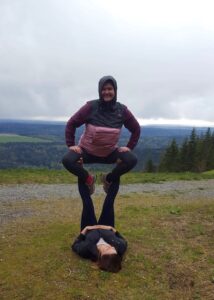
find your best treasures and gemstones along the way. As a family we have found the most exciting adventures come when you have no plans or expectations. Our favorite getaway is Whidbey Island. We love to hike near Deception Pass early in the
morning, spend our afternoon rock collecting along the beach and finding a group sized hammock to watch the leaves dance about the air. Of course, there’s always ice cream and more beaches to comb. We grab a bite to eat and find ourselves in a formidable game of monopoly as we are tucked away in the corner of some random market. We always cap our day playing at the arcade and going to the drive in.
I also enjoy camping, hiking, and doing acro-yoga. Acro-yoga is both exhilarating and empowering. Though I admit my absolute favorite hobby is finding a basketball court in any place we discover and pretending to play basketball as my daughter tries her very best to let me score some points.
Anything else you’d like to add!
Back to Rock Tumbling and Rock Hounding, I know it’s an unusual hobby, but it is so exciting. When I was early in my recovery I was often fidgeting, nervous, and shaken. I would go places and invite the most distasteful stares and stigma. I needed to find a way to harness all that energy into something that was a grounding point. One day I found a random rock laying around and I scooped it up into my pocket. I later found myself fiddling with this glorious rock and the fidgeting became isolated, it stopped the stares, and it gave me freedom from the stigma. I loved the feeling of being able to anchor all the energy I felt into something. As I have grown through my experiences, I have found multiple layers of grounding, but this one has always been at the forefront of my heart.
-
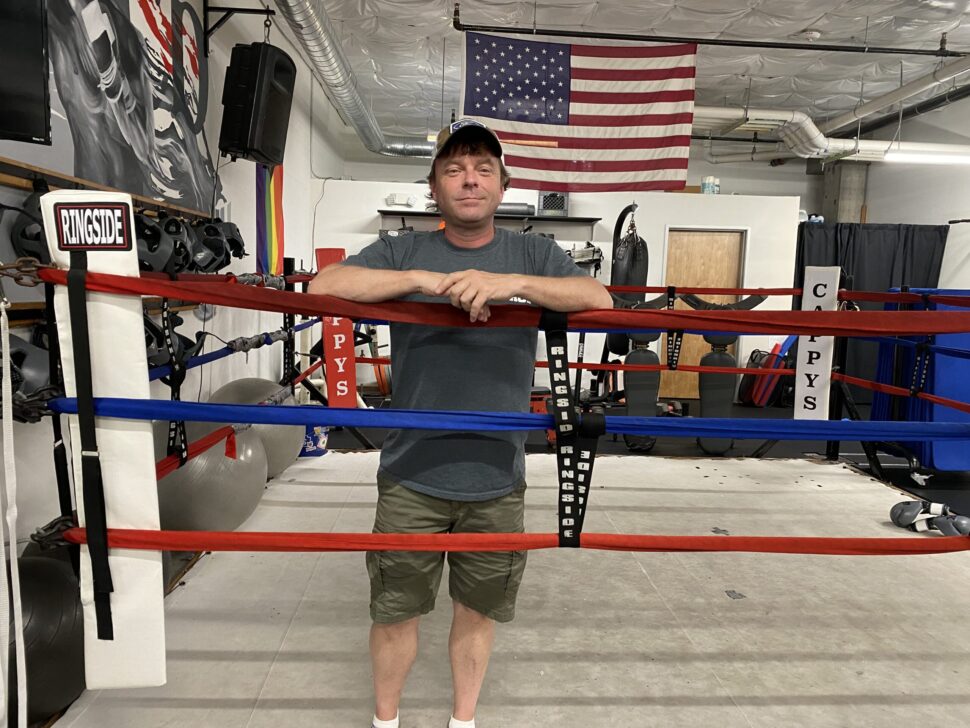
Lessons From Boxing: In Life And In The Ring
“Come to boxing and you’re going to learn about yourself…”
Boxing is often thought of as a fast-paced workout, but it can be more than just a way to work up a sweat.
Mike, the owner of Cappy’s Boxing Gym in Seattle says that the sport creates a healthy environment for cultivating self-awareness. He states, “I started boxing and very early on learned that it’s a safe space for self-awareness and self-development… I love the physicality of boxing and linking that physicality to life.”
Mike began boxing 18 years ago at Cappy’s and immediately fell in love with the sport. He then became a coach and eventually bought the gym.
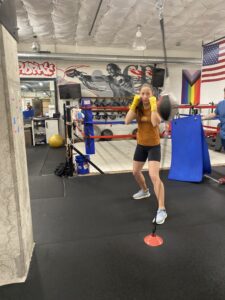 Learning through Movement
Learning through MovementBoxing involves working in sometimes intense and elevated situations such as being close to others during punching drills like mitwork.
When in close contact, emotions may become heightened and behavioral patterns can be revealed. This environment can illuminate fight, flight, or freeze responses.
Learning how to handle situations where you are scared or uncomfortable is one of the most empowering things a person can do.
It helps us recognize our patterns and reactions so that we can change them if needed in the future. This type of self-awareness also helps build confidence, making us feel better about ourselves and more confident when facing other difficulties in life.
Responding in the Moment
We all have challenges that we face, whether that be in the boxing ring against an opponent or within ourselves.
In these scenarios, it can be helpful to identify automatic reactions.
Mike explains, “When you’re typically in that heightened situation, you’re timid, you don’t like being there. A skilled opponent in boxing can pick that off easily because they can sense that. Do you stand with confidence and deal with the situation even when inside you’re going ‘oh my gosh get me out of here, this is not good’?”
Whether you’re dealing with a physical situation or emotional one, being able to respond in the moment is a skill.
Learning your patterns has power. If you can recognize your default response, you then have the ability to learn and change your reaction.
You can explore ways to improve your responses and make choices in the next situation that serve you better.
Mike elaborates, “In that heightened situation when shit hits the fan, then you learn, is that [automatic response] efficient? Does this work for you? What adjustments do you want to make to those defaults?”
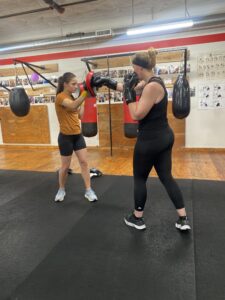 What to Expect
What to ExpectAll levels are welcome at Cappy’s boxing. Mike says, “Most boxers, when they start, are super nervous. It’s a heightened situation just walking downstairs into the gym. That’s super common. I appreciate that authenticity.”
Classes are group fitness based and follow a circuit training format. Boxers work on the fundamentals of boxing such as stance, cover, and punches.
Boxers are paired up and moved through different stations that last 2-3 minutes – the typical length of a boxing round. Each station has a different focus and drill.
Mike sets the scene, “You’ve got a coach telling you what you’re doing and what the drill is, then they’re letting you go and practice it. You might feel like you suck at it or like you’re a badass or somewhere in between.”
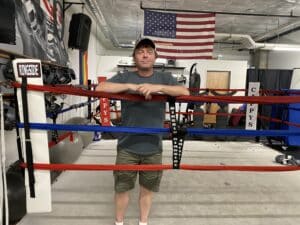
More Than a Workout
The overall feel of the class is energetic and lively. Everyone is working to the best of their ability, some are exhausted and taking a break while others are pushing through the entire workout.
Mike elaborates, “Everyone is doing it [boxing] at their own pace and we’re just guiding them along the way. The beginner level is basic body awareness and being able to understand, ‘Hey you’re gassing out. Let’s make some modifications. Let’s pace ourselves.’”
Mike believes in boxing, not only as a form of fitness, but as a form of self-discovery, confidence building, and connection.
Mike says, “We’re here to work out. We’re here to do what we can, at whatever level that is. We’re here to have a good time and interact with other people.”
Boxing is offered twice a month on Monday evenings. Register for the next class here.
-

After the Emerald Cup – Report From the Bodybuilding Stage
Report From the Stage
Recovery Beyond staff member, Jenn Boudreau, competed at the recent 40th Anniversary Emerald Cup Bodybuilding & Fitness Expo. Jenn, a seasoned bodybuilding competitor, was no stranger to the Emerald Cup.
After three thwarted attempts at joining the competition due to injury, pregnancy, and coaching, the 2017 Emerald Cup was previously her final appearance in the bodybuilding arena. “I’ve never put so much effort into anything in my life,” says Jenn, “Before, if I didn’t win my world was shattered. Now, my self worth is no longer tied to my placing.”
Bodybuilding helped Jenn maintain her substance use recovery. The gym was a space where she was surrounded by others who weren’t focused on drinking. “My first attempt at prep was my first attempt at sobriety as well,” she explains.
Growing Through the Years
Prior to taking the stage, the 2022 Emerald Cup proved different from previous years competitions.
As Jenn prepared to go before the judges, she noticed a shift in her mentality, “I think when I was younger, I was always fighting with my body and felt like I was trying to ‘punish’ it to get it to do what I wanted. This prep was more like coaxing it, and trusting that it was going to get there, even in the first few weeks of prep when I was still adding muscle so I didn’t see the scale move.”
This mindset translated to the competition stage. In previous years, Jenn struggled with the ever-changing standards of perfection. Bodybuilding judging is subjective. Competitors train to look a certain way, then might find the judges prefer a different body-type all together.
Striving for contrasting versions of the perfect physique took a toll on Jenn, “After so much internal turmoil of never being enough or never being good enough, and an injury, I put up my heels. Going on stage this time [in the 2022 Emerald Cup] I was in love with my body, I didn’t care how I measured up against the other girls, and I didn’t see one person who made me feel like I wasn’t good enough. I felt this not because everybody else wasn’t competitive or in shape, I just really liked my body and it had come through for me exactly on time, performed exactly how I needed it to and I was grateful for it.”
Overlap of Recovery and Training
Recovery Beyond is proud of the determination, commitment, and intention Jenn puts into all areas of her life. T
here are parallels between recovery from substance use disorders (SUDs) and training for a fitness event; it takes time, it can be painful, and it can be hard to trust the process.
Jenn explains, “Recovery from SUD requires that you do things that are uncomfortable, you have to force yourself to do things when you don’t feel like doing them and when it might even hurt to do them. Fitness, training for something in particular, is very good practice for the things you need to do to recover. You have to follow a workout plan/treatment plan. It hurts sometimes in the beginning (early sobriety is often painful) and you are sore and tired afterwards (completing the 12 steps or talking with a peer support counselor can have a similar effect emotionally you feel raw and exhausted).
The biggest difference is that fitness has tangible, measurable and visible results. You can see the transformation occurring and you get stronger and daily activities become easier.
When you realize that you can push through the pain, and the results are beyond what you ever thought you could obtain, a confidence and sense of pride or accomplishment develops. This often translates into other walks of life.
It’s easier for someone who has trained 16 weeks for something and knows that the results at the end of it are phenomenal, to push through the pain of recovery steps, where often there are no visible results, and trust that at the end of 16 weeks they will have accomplished something worth the pain.”
-

Recovery Beyond Sponsors Bodybuilding Competitor
Recovery Beyond, a local non-profit that facilitates healthy lifestyle and social support activities for people in recovery, is proud to sponsor Jenn Boudreau at the 40th Anniversary Emerald Cup Bodybuilding & Fitness Expo from April 29th-30th. Jenn, a seasoned bodybuilding competitor, is no stranger to the Emerald Cup. After three thwarted attempts at joining the competition due to injury, pregnancy, and coaching, the 2017 Emerald Cup was her final appearance in the bodybuilding arena. Now, she’s coming back to the same stage to revisit a goal she set for herself many years ago. “I’ve never put so much effort into anything in my life,” says Jenn, Recovery Beyond staff member and bodybuilding competitor. “Before, if I didn’t win my world was shattered. Now, my self worth is no longer tied to my placing.”
Bodybuilding helped Jenn maintain her substance use recovery. The gym was a space where she was surrounded by others who weren’t focused on drinking. “My first attempt at prep was my first attempt at sobriety as well,” she explains. “If I had had this group [Recovery Beyond] at the last Emerald Cup I probably would have won. I took second place in two divisions [at the 2017 Emerald Cup] and not because I didn’t have the physique but because I couldn’t stop drinking during that prep. I’m positive if I had not been drinking at all in that prep, I probably would’ve won…I’m coming back knowing that [drinking] won’t be the thing that stops me.”
Jenn recalls conversations she had with fellow competitors while working a Recovery Beyond booth at a bodybuilding event earlier this year. “[They] secretly wanted to make sure no one was listening to us and whispered, ‘I’m in recovery too.’ I told them literally every single person who has come to the booth has said that to us. They were baffled. They were falling over like, ‘What really? There are other people who like bodybuilding who are in recovery as well?’ They couldn’t believe it. It was great to be able to bring it to the competitors’ attention that most of them were in recovery.”
Recovery Beyond hopes that sponsoring Jenn will create awareness of substance use disorder and spread the word that there is a recovery community that enjoys fitness and healthy lifestyle activities as a pathway for recovery. Megan Fisher, the new Executive Director for Recovery Beyond, a person in long-term recovery, and an advocate for stigma reduction, shares what fitness did for her recovery. “I was close to two years abstinent from alcohol, but couldn’t put down the cigarettes. I got involved in a running group through my church and ended up slowly training for the Chicago Marathon. Every day, as I worked through my run/walk cycle, I reminded myself that a cigarette would destroy my goal. The community of supportive friends who had a common purpose drove me to keep showing up. I ran that marathon, I’m 14 years sober, and I’ve been smoke-free ever since!”
Archive for 2022
Recovery Beyond > 2022

